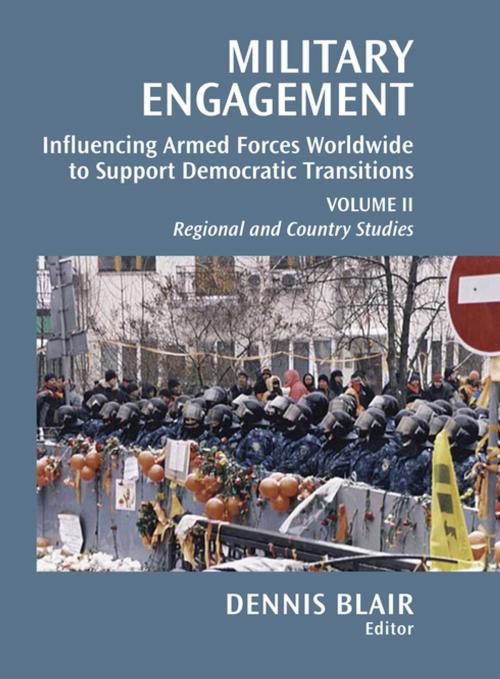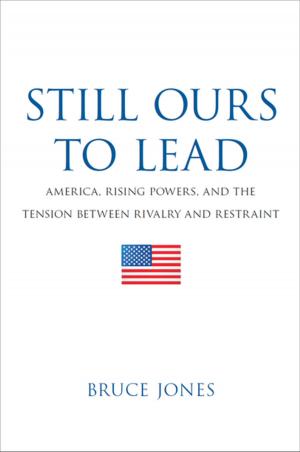Military Engagement
Influencing Armed Forces Worldwide to Support Democratic Transitions
Nonfiction, Social & Cultural Studies, Political Science, International, International Security, International Relations| Author: | ISBN: | 9780815724803 | |
| Publisher: | Brookings Institution Press | Publication: | June 28, 2013 |
| Imprint: | Brookings Institution Press | Language: | English |
| Author: | |
| ISBN: | 9780815724803 |
| Publisher: | Brookings Institution Press |
| Publication: | June 28, 2013 |
| Imprint: | Brookings Institution Press |
| Language: | English |
The response of an autocratic nation's armed forces is crucial to the outcome of democratization movements throughout the world. But what exact internal conditions have led to real-world democratic transitions, and have external forces helped or hurt? Here, experts with military and policy backgrounds, some of whom have played a role in democratic transitions, present instructive case studies of democratic movements. Focusing on the specific domestic context and the many influences that have contributed to successful transitions, the authors write about democratic civil-military relations in fourteen countries and five world regions. The cases include Argentina, Chile, El Salvador, Egypt, Hungary, Indonesia, Lebanon, Nigeria, Philippines, Senegal, South Africa, Spain, Syria, and Thailand, augmented by regional overviews of Asia, Europe, Latin America, North Africa and the Middle East, and sub-Saharan Africa.
Contributors: Richard Akum (Council for the Development of Social Sciences in Africa), Ecoma Alaga (African Security Sector Network), Muthiah Alagappa (Institute of Security and International Studies, Malaysia), Suchit Bunbongkarn (Institute of Security and International Studies, Thailand), Juan Emilio Cheyre (Center for International Studies, Catholic University of Chile), Biram Diop (Partners for Democratic Change-African Institute for Security Sector Transformation, Dakar), Raymundo B. Ferrer (Nickel Asia Corporation), Humberto Corado Figueroa (Ministry of Defense, El Salvador), Vilmos Hamikus (Ministry of Foreign Affairs, Hungary), Julio Hang (Argentine Council for International Relations), Marton Harsanyi (Stockholm University), Carolina G. Hernandez (University of the Philippines; Institute for Strategic and Development Studies), Raymond Maalouf (Defense expert, Lebanon), Tannous Mouawad (Middle East Studies, Lebanon), Matthew Rhodes (George C. Marshall European Center for Security Studies), Martin Rupiya (African Public Policy and Research Institute), Juan C. Salgado Brocal (Academic and Consultant Council for Military Research and Studies, Chile), Narcís Serra (Barcelona Institute of International Studies), Rizal Sukma (Centre for Strategic and International Studies, Jakarta).
The response of an autocratic nation's armed forces is crucial to the outcome of democratization movements throughout the world. But what exact internal conditions have led to real-world democratic transitions, and have external forces helped or hurt? Here, experts with military and policy backgrounds, some of whom have played a role in democratic transitions, present instructive case studies of democratic movements. Focusing on the specific domestic context and the many influences that have contributed to successful transitions, the authors write about democratic civil-military relations in fourteen countries and five world regions. The cases include Argentina, Chile, El Salvador, Egypt, Hungary, Indonesia, Lebanon, Nigeria, Philippines, Senegal, South Africa, Spain, Syria, and Thailand, augmented by regional overviews of Asia, Europe, Latin America, North Africa and the Middle East, and sub-Saharan Africa.
Contributors: Richard Akum (Council for the Development of Social Sciences in Africa), Ecoma Alaga (African Security Sector Network), Muthiah Alagappa (Institute of Security and International Studies, Malaysia), Suchit Bunbongkarn (Institute of Security and International Studies, Thailand), Juan Emilio Cheyre (Center for International Studies, Catholic University of Chile), Biram Diop (Partners for Democratic Change-African Institute for Security Sector Transformation, Dakar), Raymundo B. Ferrer (Nickel Asia Corporation), Humberto Corado Figueroa (Ministry of Defense, El Salvador), Vilmos Hamikus (Ministry of Foreign Affairs, Hungary), Julio Hang (Argentine Council for International Relations), Marton Harsanyi (Stockholm University), Carolina G. Hernandez (University of the Philippines; Institute for Strategic and Development Studies), Raymond Maalouf (Defense expert, Lebanon), Tannous Mouawad (Middle East Studies, Lebanon), Matthew Rhodes (George C. Marshall European Center for Security Studies), Martin Rupiya (African Public Policy and Research Institute), Juan C. Salgado Brocal (Academic and Consultant Council for Military Research and Studies, Chile), Narcís Serra (Barcelona Institute of International Studies), Rizal Sukma (Centre for Strategic and International Studies, Jakarta).















